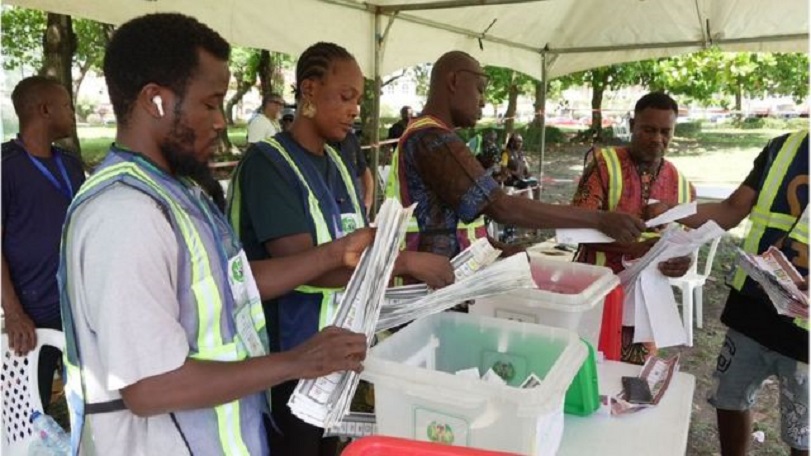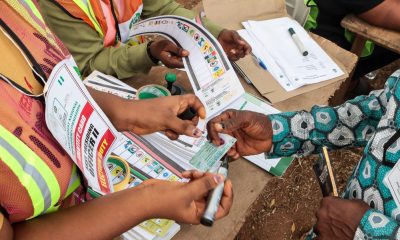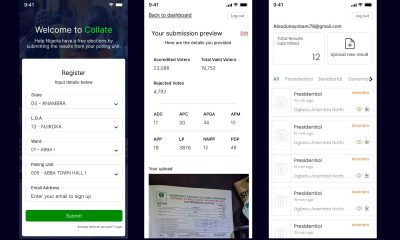General
Lagos, 27 Others to Hold Governorship Elections Saturday
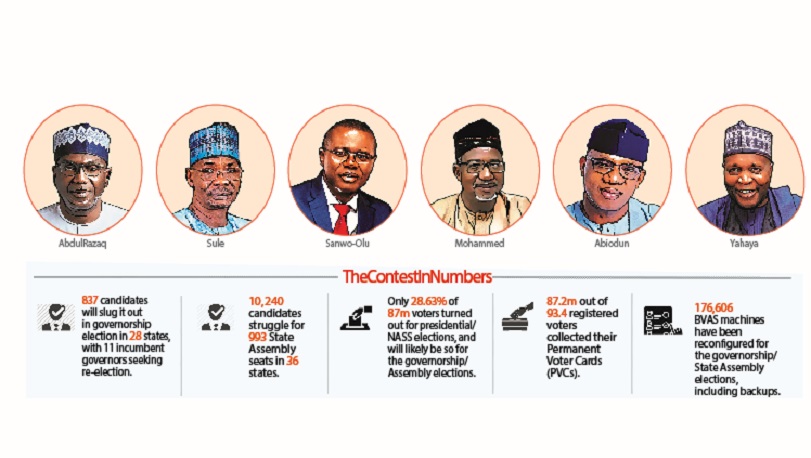
By Adedapo Adesanya
Nigerians will head to the polls again on Saturday, March 18, 2023, to elect governors and state assembly members following a one-week extension.
In all, 18 political parties fielded candidates for the governorship elections slated to hold in 28 out of the 36 states of the federation.
This is so because the governorship elections of eight states, Anambra, Bayelsa, Edo, Ekiti, Imo, Kogi, Osun, and Ondo, are held off-season due to litigations and court judgments that brought the incumbents in.
However, elections for members of the state legislature will hold in all 36 states of the federation.
Thousands of candidates are competing for 993 State House of Assembly seats, according to data from the Independent National Electoral Commission (INEC).
In alphabetical order, the 28 states where governorship elections will hold on March 18, 2023, are Abia, Adamawa, Akwa Ibom, Bauchi, Benue, Borno, Cross River, Delta, Ebonyi, Enugu, and Gombe.
Others are Jigawa, Kaduna, Kano, Katsina, Kebbi, Kwara, Lagos, Nasarawa, Niger, Ogun, Oyo, Plateau, Rivers, Sokoto, Taraba, Yobe, Zamfara.
Nigerians will be hoping that issues raised during the presidential and National Assembly elections will be minimal, especially those of disenfranchisement and technological glitches.
On its part, INEC will have to contend with many modalities expected with the Bimodal Voter Accreditation System and its Result Viewing Portal (IReV).
The IReV and the BVAS are new technologies introduced by the electoral body for the accreditation and electronic transmission of votes for this year’s polls, but they had issues during the presidential elections.
On its part, the electoral umpire said it had learned its lessons and will be hoping to salvage its reputation at the gubernatorial and state assemblies polls.
In Lagos, Mr Babajide Sanwo-Olu, the All Progressives Congress (APC) incumbent, will be hoping to align with the centre following the emergence of tough competition from Labour Party’s Gbadebo Vivour-Rhodes. Recall that during the presidential election, APC had lost Lagos, the nucleus of the President-elect, Mr Bola Tinubu, to LP’s Peter Obi.
In Oyo state, Seyi Makinde will be hoping to keep his seat with PDP for another four years as the party continues an internal rebellion that he was involved in with four other governors, including Rivers state Nyesom Wike, Samuel Ortom (Benue), Seyi Makinde (Oyo), Okezie Ikpeazu (Abia), and Ifeanyi Ugwuanyi (Enugu).
The five governors were consistent in their demand that Mr Iyorchia Ayu steps down as PDP national chairman as a precondition for them to support the presidential ambition of the party’s flag bearer, Mr Atiku Abubakar. He ended up losing the states.
Governor Okezie Ikpeazu might fail in his bid to ensure his party, the Peoples Democratic Party (PDP), retains power after he lost his senatorial bid. An emergent Mr Alex Otti may yet ride on the rising LP force.
In Kaduna, outgoing Nasir el-Rufai may have to contend with tensions that can see his APC lose its base to PDP, which won all three senatorial seats or LP.
General
Court Schedules April 23 for El-Rufai’s Arraignment
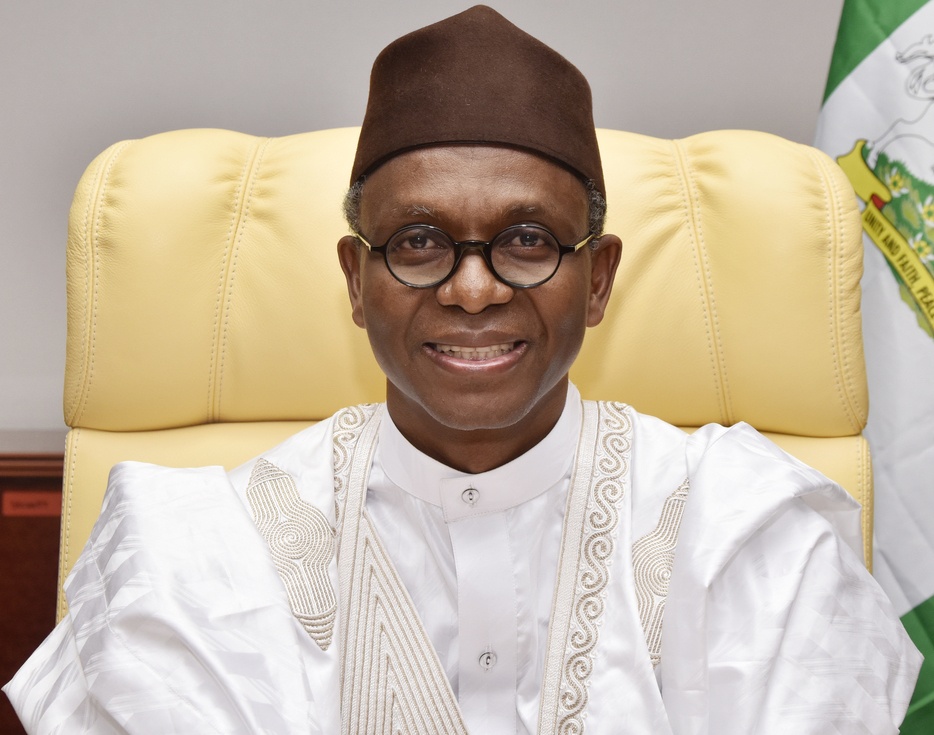
By Adedapo Adesanya
Justice Joyce Abdulmalik of the Federal High Court in Abuja has adjourned the case against former Kaduna State Governor, Mr Nasir El-Rufai, to April 23 for arraignment.
The Department of State Services (DSS) filed a three-count charge against Mr El-Rufai for the alleged unlawful interception of communications, linked to remarks he made during a television interview. It was alleged that Mr El-Rufai’s actions contravened provisions of the Cybercrimes (Prohibition, Prevention, etc.) Amendment Act, 2024, and the Nigerian Communications Act, 2003.
The court had earlier fixed February 25 for the former governor’s arraignment, but he was absent during Wednesday’s proceedings.
Counsel for the DSS, Mr Oluwole Aladedoyin, informed the court that the former governor is still in the custody of the Independent Corrupt Practices and Other Related Offences Commission (ICPC), where he is under investigation for alleged misappropriation of funds.
This prompted the judge to adjourn the case to April 23 for arraignment.
Meanwhile, the former Kaduna governor has filed a suit in response to Charge Number FHC/ABJ/CR/99/2026 instituted against him at the Federal High Court in Abuja.
The application contends that the prosecution violates several constitutional provisions that breach El-Rufai’s fundamental rights, including Section 36(5) of the 1999 Constitution, which guarantees the presumption of innocence; Section 36(11), which provides for the right against self-incrimination; Section 36(12), which requires that offences be defined in written law; as well as Sections 39 and 40, which guarantee the rights to freedom of expression and freedom of association, respectively.
Mr El-Rufai’s motion is praying the court for: “An Order quashing and/or striking out Charge No. FHC/ABJ/CR/99/2026 (as contained in the charge dated February 16, 2026) for being incompetent, for disclosing no offence known to law, and for constituting a gross abuse of court process.
An Order discharging the defendant/applicant on the ground that the charge discloses no prima facie case against him.
He is equally seeking an order awarding the sum of N2 billion as costs against the secret police (acting through its prosecuting counsel) for the abuse and misuse of the court process, and the egregious, reckless, and unconstitutional misuse of the criminal justice system to harass, embarrass, and publicly victimise him.
The suit, which cites 17 grounds for seeking the dismissal of the charges, was filed on 17 February 2023.
His lawyers notified the Director General of the DSS of the processes that they have filed in the matter via a letter dated 18th February. The letter also formally informed the DSS regarding the legal representatives of Mr El-Rufai and the names and addresses of his team of counsel.
The grounds cited in the motion seeking the dismissal of the charges include: their constitutional invalidity, lack of disclosure of a prima facie case, citing offences not known to law and failure to meet statutory conditions.
Other grounds cited include fatal duplicity and absence of evidence, lack of prosecutorial competence, the impermeable nature of the constitutional right against self-incrimination, bad faith, political persecution and abuse of court process.
General
Nigeria Signs Defence Joint Venture with Terra Industries

By Adedapo Adesanya
Nigeria has signed a joint venture with defence technology company, Terra Industries Limited, as part of efforts to boost the country’s defence industrial capacity and advance indigenous high-technology development.
The Defence Industries Corporation of Nigeria (DICON) and Terra signed a Memorandum of Understanding (MoU) for the establishment of the Joint Venture Company (JVC), both parties announced on Monday.
The partnership provides a robust framework for the local production, assembly, research and development (R&D), and training in high-technology systems, including drones, cybersecurity solutions, robotics, and other ancillary software and hardware platforms.
The MoU, executed pursuant to the DICON Act 2023, underscores DICON’s statutory mandate to collaborate with indigenous and foreign defence-related industries through Public-Private Partnerships. Under the agreement, the Joint Venture Company will operate as a subsidiary of DICON, jointly promoted and owned by DICON and Terra Industries, and duly incorporated in Nigeria.
This marks the latest move by Terra, which recently became a $100 million company, following recent raises from investors including Flutterwave CEO, Mr Gbenga Agboola, American actor Jared Leto as well as 8VC founded by the co-founder of Palantir Technologies Inc., Mr Joe Lonsdale. Other investors included Valor Equity Partners, Lux Capital, SV Angel, Leblon Capital GmbH, Silent Ventures LLC, Nova Global.
Terrahaptix, founded by Mr Nathan Nwachukwu and Mr Maxwell Maduka, are using the new funding to expand Terra’s manufacturing capacity as it expands into cross-border security and counter-terrorism.
The latest agreement with DICON is designed to establish advanced production and assembly lines for high-tech equipment within Nigeria, while promoting meaningful technology transfer, skills development, and specialised training for Nigerian personnel.
It also aims to strengthen local sourcing of raw materials, reduce dependence on imports, and enhance domestic industrial capacity and strategic autonomy. Additionally, the partnership will support the supply of security equipment to the wider Nigerian security agencies, other security agencies, positioning Nigeria as a competitive player in the global defence manufacturing sector.
Under the agreement, Terra Industries will provide technical expertise, professional services, and training, and will attract both local and foreign investment to strengthen the defence industrial ecosystem.
The company will also facilitate the procurement of production equipment, coordinate local and international training programmes, and provide access to manufacturing know-how, tooling, spare parts, and established defence sector supply chains.
Speaking on this, Mr Nathaniel Nwachukwu, CEO of Terra Industries, noted that the partnership “Demonstrates confidence in indigenous Nigerian engineering capability and creates a platform for sustainable defence technology development, innovation, and export competitiveness.”
On his part, Major General BI Alaya, the Director General of DICON, described the agreement as “A transformational step toward strengthening Nigeria’s defence manufacturing base, reducing import dependence, and positioning Nigeria as a regional hub for advanced innovation.”
The need for security has risen in recent years, as groups such as Islamic State and al-Qaeda are gaining ground in Africa, converging along a swathe of territory that stretches from Mali to Nigeria.
General
Deep Blue Project: Mobereola Seeks Air Force Support

By Adedapo Adesanya
The Director General of the Nigerian Maritime Administration and Safety Agency (NIMASA), Mr Dayo Mobereola, is seeking enhanced cooperation between the agency and the Nigerian Air Force (NAF) with the aim of strengthening tactical air support within the Deep Blue project.
During a courtesy visit last week, Mr Mobereola told the Chief of Air Staff, Air Marshall S. K. Aneke at the NAF Headquarters in Abuja, that the Air Force was a strategic partner in enhancing maritime security in Nigeria and sustaining the momentum of the Deep Blue Project’s success.
According to the DG, “We are here to seek the Air Force’s support, given the importance of tactical air surveillance to the Deep Blue Project. Nigeria is the only African country with a record of zero piracy within the last 4 years. The Deep Blue Project platforms have been used to achieve zero piracy and sea robberies in the Gulf of Guinea, and we need your collaboration to sustain this momentum”.
He further emphasised that international trade depends on security, which is why vessels prefer to go to or transit through countries where they are secured. “With the traffic we have now, we need to show more security might through collaboration to strengthen our trade viability because of the risks attached to our route. We need these collaborations to sustain what we have achieved so far with the Deep Blue Project”.
The NIMASA DG expressed hope that the collaboration with the Nigeria Air Force will reduce response time.
On his part, the Chief of Air Staff, Air Marshall S.K. Aneke, noted that the Air Force desires to be “a very supportive and collaborative partner with NIMASA and is ready to match the Agency step by step and side by side to achieve the desired results.”
He noted that “collaboration between NIMASA and the Nigerian Air Force under the Deep Blue Project can be strengthened through a joint strategic framework, integrated command structures, and a standing steering committee to ensure shared objectives and accountability.
“Establishing a joint maritime domain awareness fusion cell will enable real-time intelligence sharing, synchronised surveillance, and faster response to maritime threats and ensure sustained operational effectiveness across Nigeria’s territorial waters and exclusive economic zone,” he said, according to a statement.
The Air Force Chief added that the Air Force can also support NIMASA outside the Deep Blue Project operations by providing its own ISR platforms, tactical air support, and rapid airborne deployment for interdictions and search and rescue missions.
While thanking the NIMASA DG for the basic trainings the Agency has provided the aircraft pilots under the Deep Blue Project, Air Marshall Aneke also highlighted areas of operational challenges needing NIMASA’s attention to include bridging the communication gap between NAF operators and NIMASA, higher level and in-depth maintenance trainings, readily available fueling of aircrafts to avoid delays on missions, and provision of flying kits among others.
He therefore pledged the Air Force’s collaboration and assured that the request by NIMASA has been noted and that things will begin to move at thrice its speed going forward.
-

 Feature/OPED6 years ago
Feature/OPED6 years agoDavos was Different this year
-
Travel/Tourism10 years ago
Lagos Seals Western Lodge Hotel In Ikorodu
-

 Showbiz3 years ago
Showbiz3 years agoEstranged Lover Releases Videos of Empress Njamah Bathing
-

 Banking8 years ago
Banking8 years agoSort Codes of GTBank Branches in Nigeria
-

 Economy3 years ago
Economy3 years agoSubsidy Removal: CNG at N130 Per Litre Cheaper Than Petrol—IPMAN
-

 Banking3 years ago
Banking3 years agoSort Codes of UBA Branches in Nigeria
-

 Banking3 years ago
Banking3 years agoFirst Bank Announces Planned Downtime
-

 Sports3 years ago
Sports3 years agoHighest Paid Nigerian Footballer – How Much Do Nigerian Footballers Earn


